I have a post on WEF YGL Vladamir Putin and how he works with the OCGFC, but you see that a western OCGFC banker is involved inside Russia along with all the “sustainable development”, and they’re setting up inside Russia for the same Great Reset as the west. They also did the same gene therapy scamdemic operation on their people as well. There is always room for a double cross, but it makes you see the Ukraine conflict as arranged as will be any expansion of the war, which if you’re in on the scheme is extremely profitable (the west working to implement conscription together seems a tell for expansion). Throw in the west’s building propaganda with China taking over Taiwan, and we might have another arranged conflict. Consequently, these sociopaths that run the world are also into population control, so all the needless death and killing checks another box for their global sustainability plans.
https://edwardslavsquat.substack.com/p/is-russia-becoming-too-sustainable
By Edward Slavsquat
Jul 13, 2024
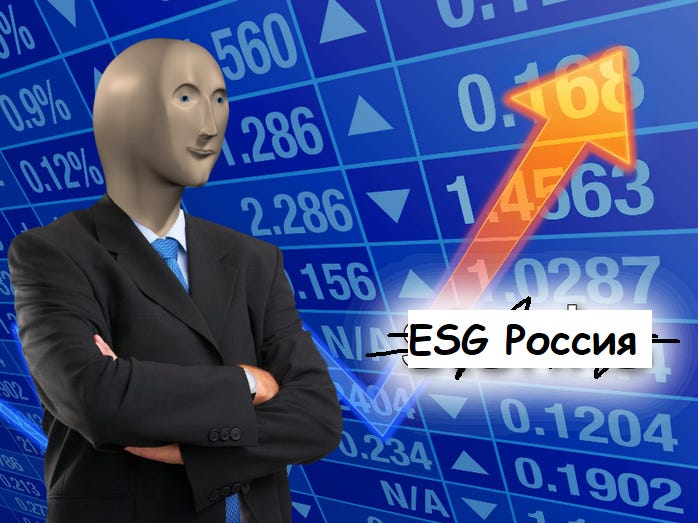
Sustainability to the moon
It’s been more than six months since we last checked on Russia’s Sustainability Status.
Does Moscow still have an insatiable appetite for all things ESG?
Short answer: Yes.
Long answer: Yes, but keep reading.
Newcomers to the blog are encouraged to survey our previous reports about the Russian government’s impressive levels of sustainability.
- Yes, Russia is part of the “sustainable development” revolution (June 12, 2022)
- Russia’s “sustainable development” cult is decadent & depraved (July 22, 2022)
- Russia’s romance with “sustainable development” is getting freaky (October 18, 2022)
- Things are getting very sustainable (March 24, 2023)
- The ESG agenda is marching across Russia (May 23, 2023)
- Sustainable development: It’s what BRICS craves! (September 1, 2023)
- G20 vs BRICS: Who is more sustainable? (September 15, 2023)
- Russia’s friendliest bank will help BRICS implement the “climate agenda” (December 11, 2023)
Please put on some PPE and make sure to double-mask because you are about to expose yourself to dangerous levels of retarded UN-approved word salad.
January 19: The ESG agenda has become an “integral part” of Russia’s business environment
We’ll begin our ESG update with a Vedomosti article from January. (Vedomosti is one of Russia’s most popular and established business-focused publications. Comparable to the Wall Street Journal.) In this article we learn that Yale World Fellow Elvira Nabiullina has been valiantly promoting the ESG agenda, which has become a “integral part of the business environment” in Russia:
In 2023, the Russian ESG agenda remained relevant despite the pressure of geopolitical risks. The topic of sustainable development continued to develop not only in the public and commercial sectors, but also in terms of regulation and infrastructure creation.
The past year started with the publication of the Bank of Russia’s recommendations on ESG ratings … The Bank of Russia plays the role of not only a regulator of the new market, but also a popularizer of the sustainable agenda in the country. […]
ESG ratings in Russia have been actively developing in the past year. They have become relevant and important for companies, investors and society. […]
Thus, in 2023, the ESG agenda gradually became an integral part of the business environment in Russia. Of course, the trends of expanding environmental, social and governance initiatives will continue to develop, stimulating innovation and creating favorable conditions for the sustainable development of the country.
January 23: “Moscow is actively involved in the ESG agenda”
A few days later, the website for Moscow’s city government announced that businesses in the capital would be able to receive “the status of compliance of organizations’ activities with the Sustainable Development Goals (SDGs)—ESG status”.
This new “ESG-compliant” status, along with “public-private partnerships”, will allow the city to achieve a very high level of sustainability:
The Sustainable Development Goals (SDGs), developed by the UN General Assembly in 2015, are aimed at addressing such global issues as poverty, inequality, climate change, economic growth and environmental protection. There are 17 goals and 169 targets, for which corresponding indicators have been defined.
“Moscow is actively involved in the ESG agenda. The city has fully met the indicators for six SDGs thanks to such tools as the program to stimulate the creation of employment opportunities, the green corridor, public-private partnerships, including offset contracts, and others. Assigning ESG status to specific organizations will become another tool for attracting investment in the capital’s economy and meeting the SDG indicators. The advantages include creating an image of a responsible and sustainable company, access to new suppliers and creation of logistics chains, easier access to foreign markets and additional opportunities for promotion in them, taking into account the global trend for sustainable development,” said Vladimir Efimov, Deputy Mayor of Moscow for Economic Policy and Property and Land Relations.
Yikes.
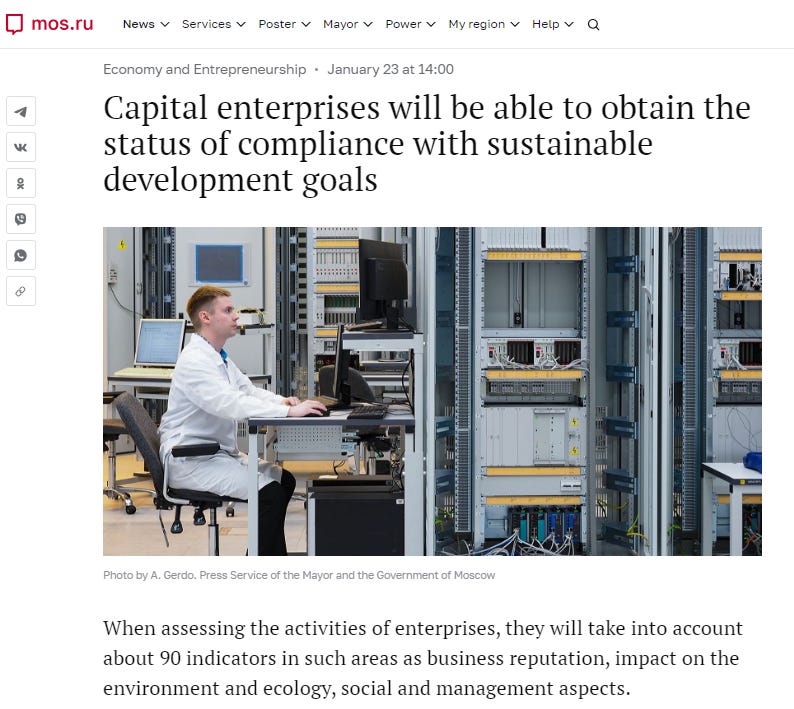
source: mos.ru
January 31: ESG bond boom in Russia
Russia’s ESG bond market is hot!
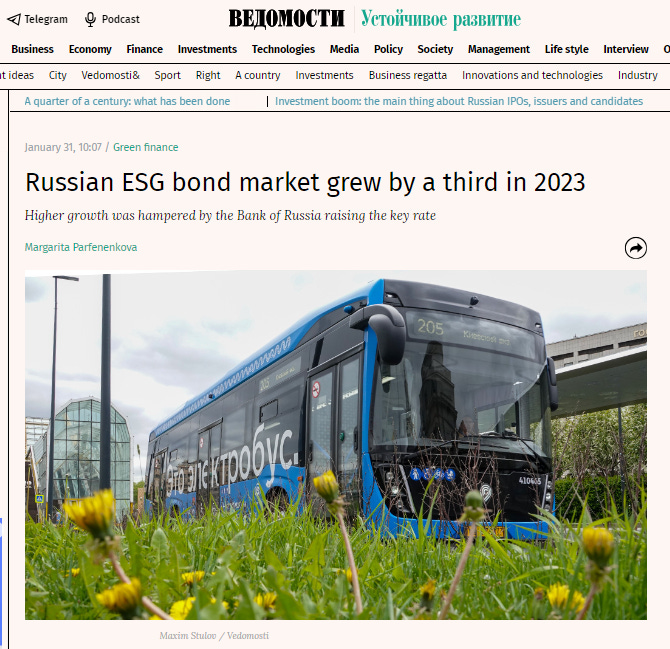
source: vedomosti.ru
The total volume of ESG bonds issued on the Russian market in 2023 amounted to 142.8 billion rubles, which is 34.5% more than in 2022, according to calculations by analysts at the National Analytical Credit Rating Agency (ACRA). The main share of the market was accounted for by green bonds, and the largest issuers here are still companies with state participation, the authors of the study note.
March 15: UN maintains partnership with sanctioned Russian companies to pursue sustainable development goals
If you are worried that international sanctions have negatively affected the ability of Russian businesses to help implement a global agenda of socioeconomic terror, there is no need to fret.
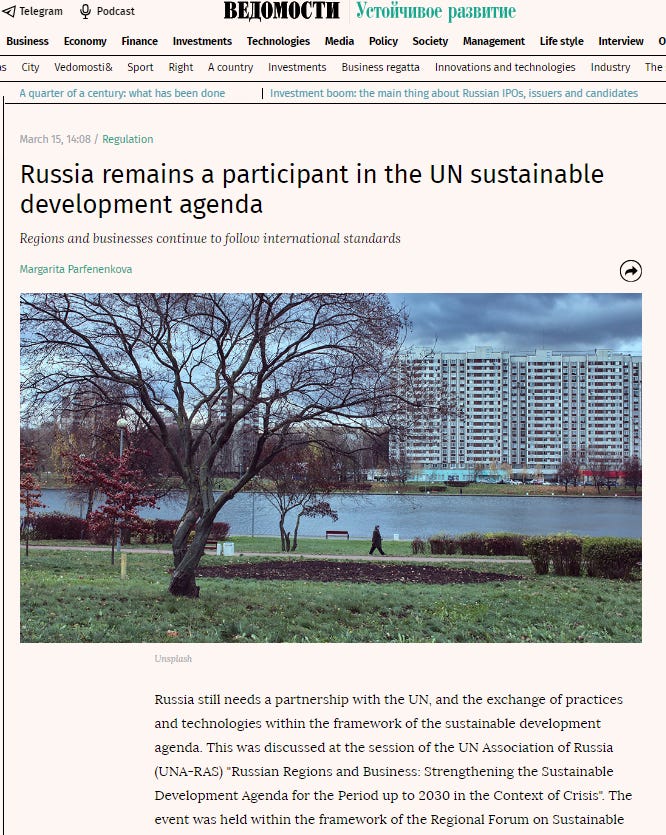
Vedomosti has the details:
Russia still needs a partnership with the UN, and the exchange of practices and technologies within the framework of the sustainable development agenda. This was discussed at the session of the UN Association of Russia (UNA-RAS) “Russian Regions and Business: Strengthening the Sustainable Development Agenda for the Period up to 2030 in the Context of Crisis”. The event was held within the framework of the Regional Forum on Sustainable Development 2024 under the auspices of the UN Economic Commission for Europe (UNECE) UNA-RAS. […]
In 2023, at the climate summit in Dubai (UAE), Moscow presented an analytical report on the climate agenda of the world’s cities. In 2024, it is planned to continue this work, expanding it to the largest cities of Russia and BRICS.
Russia has been and remains an active participant in the international agenda, summarized Natalia Dorpeko, Executive Director of the National Network of the Global Compact Association. [..]
The UN Global Compact has retained the participation of all Russian companies without exception, even those under sanctions, she added. All companies have retained their current status, which will allow them to maintain interaction at the international level and create new partnerships.
For those who are unfamiliar: The UN Global Compact is “a non-binding United Nations pact to get businesses and firms worldwide to adopt sustainable and socially responsible policies, and to report on their implementation.”
April 2: “2024 marks a new start for ESG transformation in Russia”
A sharp decline in exports to Europe over the past two years prompted some Russian businesses to deincentivize compliance with cross-border carbon regulations and other sustainable claptrap, but this trend is being rapidly reversed thanks to the noble efforts of Russia’s central bank and BRICS.
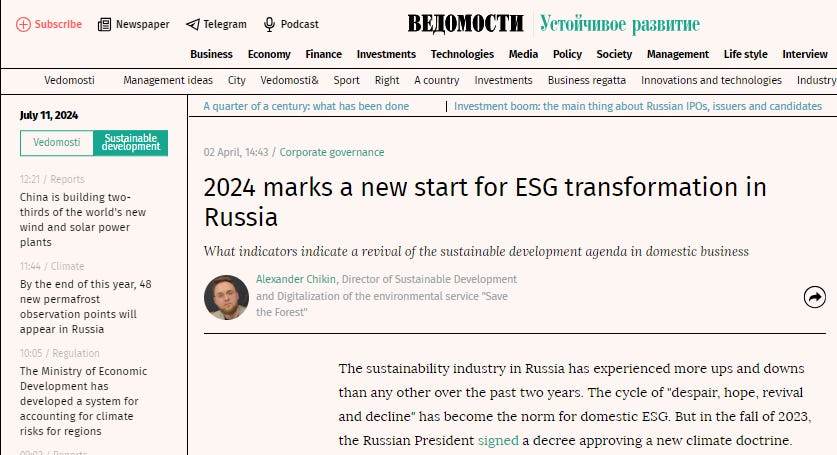
source: vedomosti.ru
In February, a meeting of representatives of banking organizations of the BRICS countries took place under the chairmanship of the Bank of Russia. It is the Bank of Russia that sets the rhetoric of the ESG agenda in our country … The inclusion of the Bank of Russia in the BRICS climate agenda is not only one of the reasons for the fundamental revival of the [ESG] agenda in 2024, but also its consequence. The regulator should be considered a guarantor of applied work on unifying the contours of ESG practices in the international bloc.
Climate projects, voluntary commitments of the non-manufacturing sector, measurable ESG statuses of companies—all this can reach the international level.
Who could have predicted that an IMF-obedient central bank and a Goldman Sachs economic bloc would ensure Russia forever remained under the ESG yoke?
April 10: Now there’s a convenient way to track “ESG indicators” for Russian businesses
Interfax (which is sort of like Russian Reuters) announced in April that “basic ESG indicators that allow assessing environmental, social risks, and the quality of corporate governance of the largest Russian companies have become available to users of [Interfax’s] information and analytical system, SPARK”.
Roman Laba, Deputy General Director of Interfax and Head of the SPARK project, explained why it was necessary to closely monitor “ESG indicators” in Russia:
“The largest Russian banks and corporations are already implementing ESG accreditation for suppliers and borrowers. In the future, customers and lenders tell us, such accreditation will become mandatory. In turn, the Ministry of Economic Development issued recommendations last year on the preparation of voluntary non-financial reporting, and in the world full unified global standards are being introduced for businesses to disclose information about sustainable development. In this situation, Russia will need convenient and generally recognized platforms that will allow companies of various sizes to join the ESG agenda, and their partners to receive all the information they need; SPARK, which always tries to be first, responded to business requests, and created such a platform,” said R. Laba.
April 15: BRICS ESG standards will help “increase confidence in the carbon market”
BRICS isn’t just enthusiastic about ESG—it’s also boosting confidence in carbon credit scams.
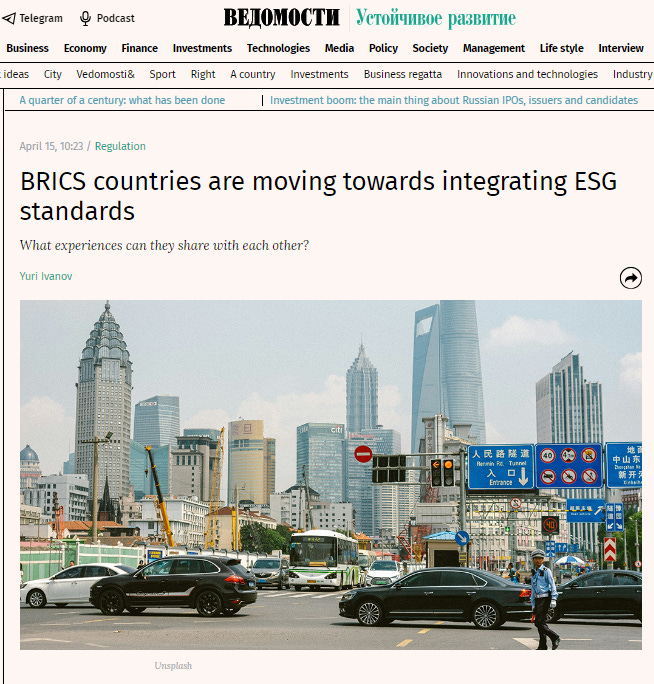
source: vedomosti.ru
As Vedomosti explained:
Among the trends that determine the advancement of the ESG agenda in a particular region of the world, the most promising ones, according to the experts surveyed, are cooperation in the area of the voluntary carbon units market and the development of regulation.
According to forecasts by the Russia-OECD Centre of the Presidential Academy, by 2030 the world is expected to see a more than 15-fold increase in demand, and by 2050, a 100-fold increase in demand.
“Cooperation between BRICS countries could increase confidence in the carbon credit market and create tools for attracting capital to implement climate projects,” comments [Ivan Yermokhin, a research fellow at the Russia-OECD Center of the Presidential Academy].
Both traditional BRICS members and newcomers are showing their involvement in the ESG agenda. “Brazil, Russia, China, and South Africa have developed sustainable finance standards. Egypt has adopted guidelines for sustainable sovereign loans, and the UAE has adopted guidelines for sustainable finance, which should eventually turn into national standards,” says Chornovol. According to Gorchakov, the defining trend in this area will be a gradual transition from recommended to mandatory non-financial reporting, as well as the adaptation of international reporting standards to local specifics (for example, in China, Russia, and India).
May 14: Bank of Russia introduces students to the joys of ESG
In May, Russia’s central bank held a 3-week online training course aimed at inducting young Russians into the cult of sustainability:
In order to improve the level of knowledge in the field of financing sustainable development and climate change, the Bank of Russia has developed a training program “ESG, sustainable development and climate change” (hereinafter referred to as the program).
The program will be of interest to students, postgraduates and university professors who are ready to immerse themselves in the subject matter and understand new trends, as well as learn about the role of the Bank of Russia in this area. […] The speakers of the webinars will be experts from the Bank of Russia, financial institutions and leading companies in the field of sustainable development. Students who successfully complete the training will be able to receive a confirmation certificate.
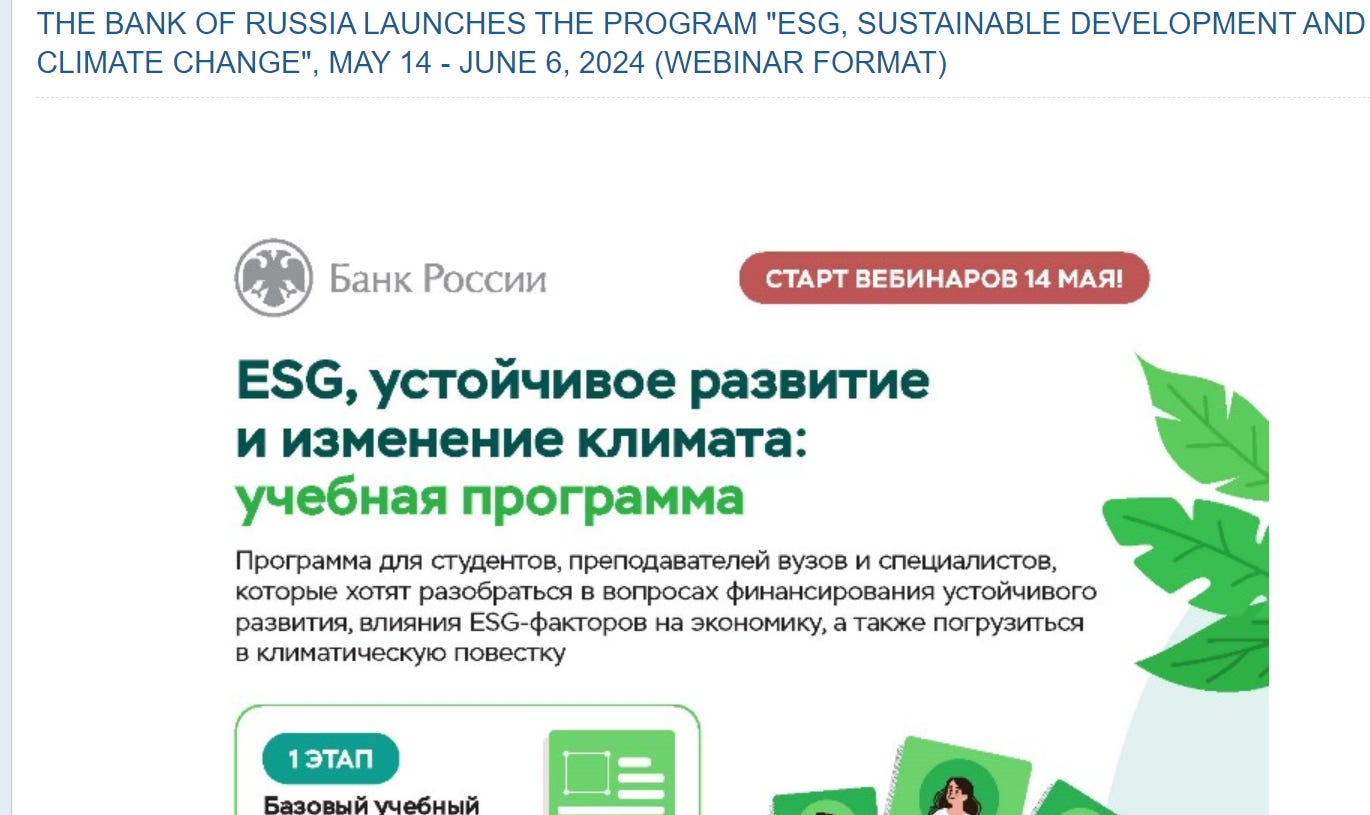
source: ispu.ru
May 21: New standard on ESG reporting will factor in “social capital” and contributions towards UN Sustainable Development Goals
In May, the Russian Ministry of Economic Development presented a new standard for reporting on sustainable development that factors in how companies’ “ESG indicators” help to achieve the UN’s SDGs.
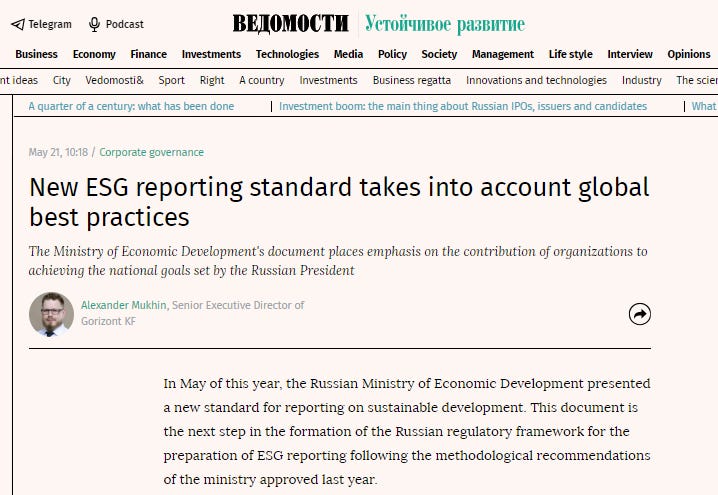
source: vedomosti.ru
The new regulations will also affect how the “social capital” of each company will be calculated:
The new document of the Ministry of Economic Development proposes to disclose ESG indicators in terms of contribution to the achievement of the UN Sustainable Development Goals (SDGs) and the national goals of Russia. A very interesting point is that some of the indicators of contribution to the implementation of national goals will be used to calculate the social capital of the organization, on the basis of which decisions can be made on the provision of government support measures. Thus, high-quality disclosure of information, which is currently voluntary, can receive a good material incentive.
So … a social credit system is being created to encourage (eventually require?) Russian companies to comply with a global agenda that will make life miserable usher in a golden age of harmonious coexistence between proles and their space lizard overlords.
May 29: Sber helps Russia develop in a very sustainable way
Vedomosti reported at the end of May that Russian companies were doubling down on the ESG agenda with help and encouragement from the country’s largest and most friendly bank:
Despite economic difficulties, four out of five companies maintain or even increase their budgets for developing sustainable development areas, according to a study by the B1 Group (former EY). But the companies’ strategy or goals in this area are changing. What businesses are doing to achieve sustainable development goals (SDGs), what initiatives they expect from the government, and how officials are stimulating the development of the climate agenda were discussed by participants in the 6th annual forum for professionals in achieving SDGs by the Vedomosti newspaper, which took place on May 15 this year in Moscow. […]
Social aspects of sustainable development have been a priority for the business community for the second year in a row, according to B1. “Human centricity is the focus of our new strategy,” notes Tatyana Zavyalova, Senior Vice President for ESG at Sber. The bank involves not only employees but also clients in the sustainable development agenda. These are large, medium and small businesses, as well as more than 108 million retail clients.
Cheers.

June 27: An “ESG Renaissance” in Russia
In June, the ESG Business Club of the Presidential Academy of the Russian Presidential Academy of National Economy and Public Administration (RANEPA) held a roundtable discussion in Samara to chat about exciting topics like the “climate agenda” and “green supply chains”.
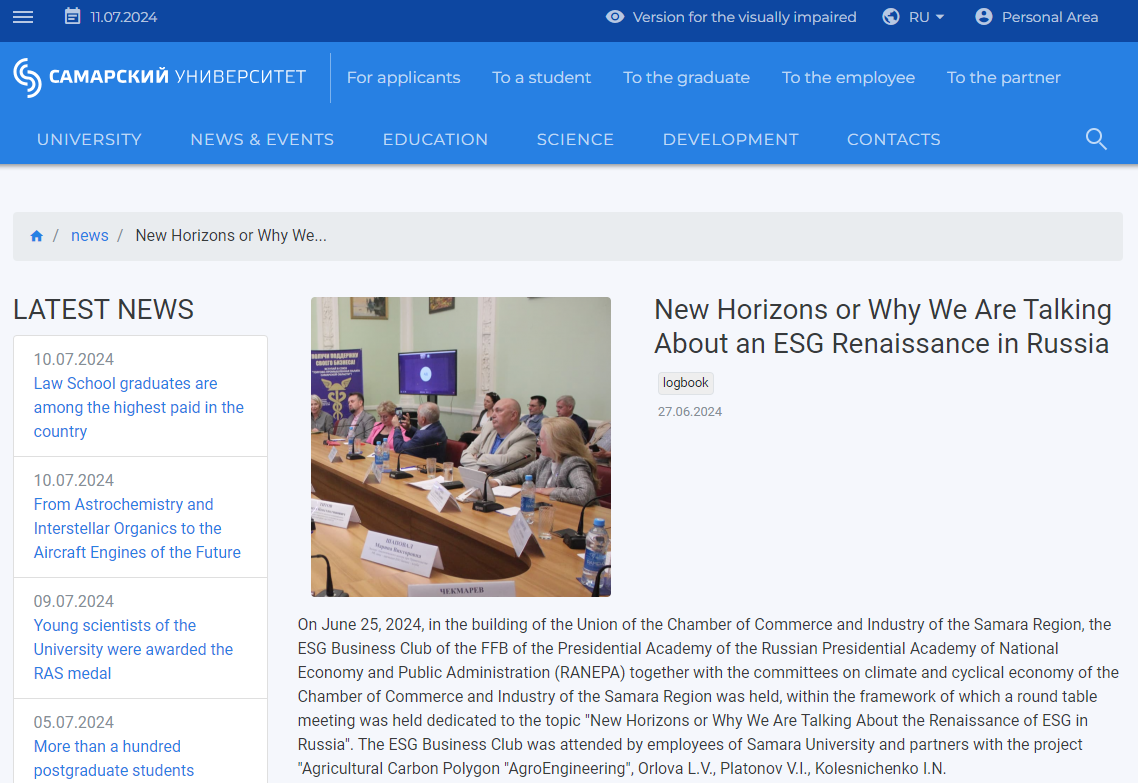
source: ssau.ru
The event was called “New Horizons or Why We Are Talking About the Renaissance of ESG in Russia”:
The ESG Business Club meeting was dedicated to the development of ESG practices in the Russian Federation, the fundamentals of legislative regulation and business opportunities that are opening up for large corporations, small and medium businesses and the region as a whole within the framework of the sustainable development agenda for the period 2030–2036.
June 28: Russian businesses want to work with SCO to promote the “ESG agenda”
Business leaders in Russia are interested in cooperating with the Shanghai Cooperation Organization (SCO) to further the goals of the “ESG agenda”, Sergey Katyrin, the president of the Chamber of Commerce and Industry of Russia, said at the end of June.
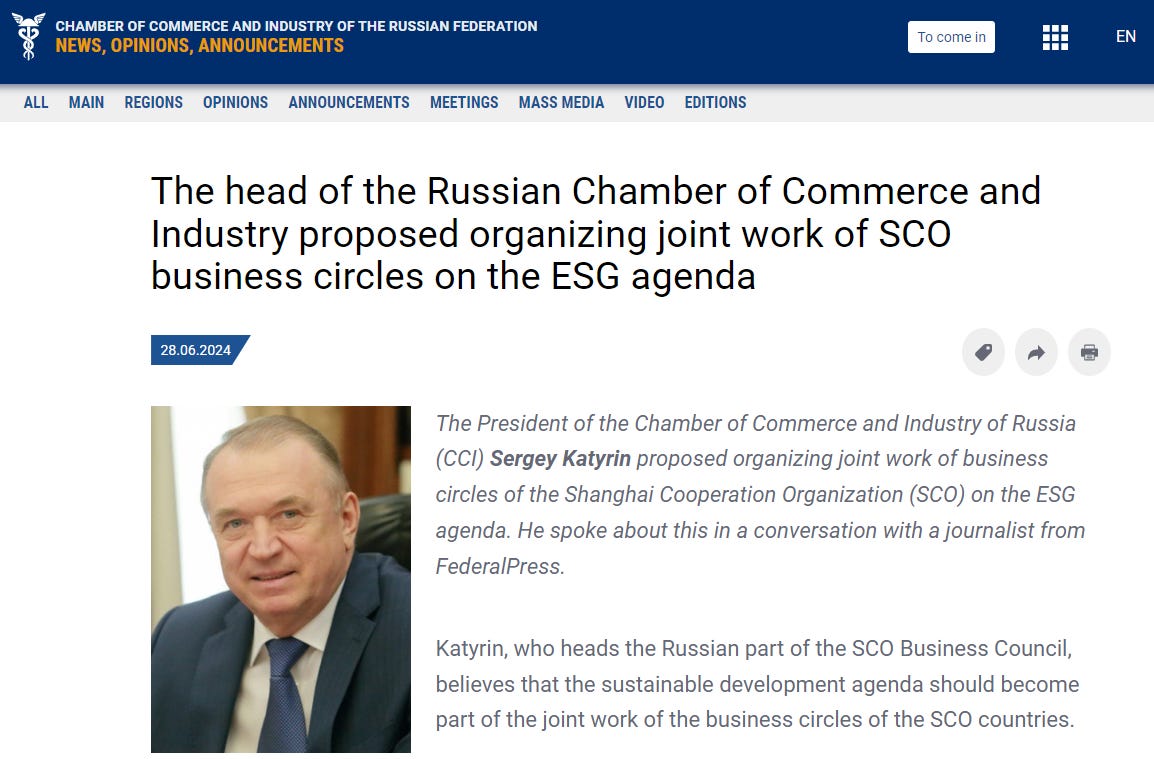
source: tppr.ru
Katyrin, who also heads Russia’s SCO Business Council, expressed hope that SCO members will work together to develop “green technologies” and “interstate electronic document management”.
July 9: A “single vector” for sustainable development
To top it all off, a recent article in Vedomosti explained how Russian businesses were eager to comply with EU ESG regulations. Yes, the same European bloc that is currently pouring weapons into Ukraine. Sure, why not?
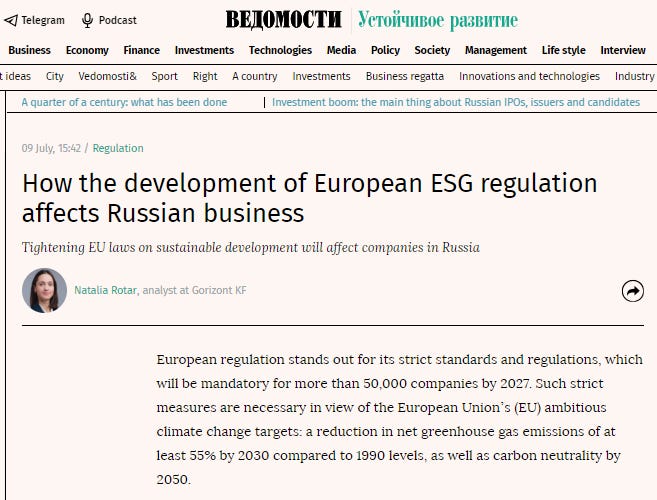
source: vedomosti.ru
Behold, a mundane paragraph from a business daily that perfectly captures the essence of our upside-down garbage world:
European legislation in the field of sustainable development is of great importance for Russian business, since the requirements may be applicable to companies that continue to work with the EU market. Against the backdrop of sanctions, Russia’s trade turnover with the EU is declining, but in 2023, Russia was among the EU’s top ten trading partners. In addition, legislative regulation in the field of sustainable development in China, India, Turkey, Russia’s new key trading partners, is actively changing and may borrow the basic principles and approaches of European regulation. […]
The EU’s carbon neutrality targets are the most ambitious, but Russia and its main trading partners also have similar targets in the longer term, which will contribute to a single vector for the development of the regulatory framework in the field of sustainable development.
Russia is part of “a single vector for the development of the regulatory framework in the field of sustainable development”—how beautifully succinct.
That’s a good place to end for today.
Have a restful Saturday.